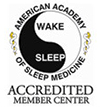
Sleep Hygiene Recommendations:
Increasing Your Sleep Drive:
- Avoid naps, except for a brief 10 to 15 minute nap 8 hours after arising; but check with your physician first, because in some sleep disorders naps can be beneficial.
- Restrict sleep period to average number of hours you have actually slept per night in the preceding week. Quality of sleep is important. Too much time in bed can decrease quality on subsequent night.
- Get regular exercise each day, preferably 40 minutes each day of an activity that causes sweating. It is best to finish exercise at least 6 hours before bedtime.
- Take a hot bath to raise your temperature 2 degrees Celsius for 30 minutes right before bedtime. A hot drink may help you relax as well as warm you.
Keeping a Daily Rhythm:
- Keep a regular time out of bed 7 days a week.
- Establish a regular wake-up time to get out of bed each morning deviating by only 1 hour on weekends and holidays.
- Do not expose yourself to bright light if you have to get up at night.
- Get at least one-half hour of sunlight within 30 minutes of your out-of-bed time.
Controlling Drug Effects:
- Do not smoke to get yourself back to sleep.
- Do not smoke after 7 PM, or give up smoking entirely.
- Avoid caffeine entirely for a 4-week trial period; limit caffeine use to no more than three cups no later than 10 AM.
- Light to moderate use of alcoholic beverages. Alcohol can fragment sleep over second half of sleep period.
Getting to Sleep and Staying Asleep:
- Keep clock face turned away, and do not find out what time it is when you wake up at night.
- Avoid strenuous exercise after 6 PM.
- Do not eat or drink heavily for 3 hours before bedtime. A light bedtime snack may help.
- If you have trouble with regurgitation, be especially careful to avoid heavy meals and spices in the evening. Do not retire too hungry or too full. Head of bed may need to be raised.
- Keep your room dark, quiet, well ventilated, and at a comfortable temperature throughout the night. Ear plugs and eye shades are okay.
- Use a bed time ritual. Reading before lights-out may be helpful if it is not occupationally related.
- List problems and one-sentence next steps for the following day. Set aside a worry time. Forgive yourself and others.
- Learn simple self-hypnosis to use if you wake up at night. Do not try too hard to sleep; instead, concentrate on the pleasant feeling of relaxation.
- Use stress management in the daytime.
- Avoid unfamiliar sleep environments.
- Be sure that your mattress is not too soft or too firm and that your pillow is the right height and firmness.
- An occasional sleep pill is probably all right.
- Use bedroom only for sleep; do not work or do other activities that lead to prolonged arousal.
- If possible, make arrangements for care-giving activities (children, others, pets) to be assumed by someone else.
Modified from Kryger M, Roth T, Dement W. Principles and Practices of Sleep Medicine. 2nd Ed, WB Saunders, 1994.




![]()